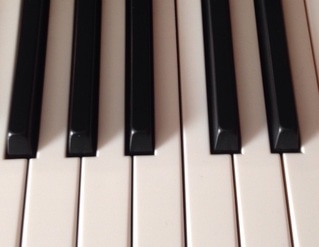
1. Warm up - the fingers and the brain. Get the fingers moving and the brain into gear by practising a few scales or an easy piece that you know well. This can help you get into the right frame of mind so that you are focused on your music practice, as well as increase the circulation in the fingers so that they are ready for more demanding work.
2. Identify problem areas. Run through the piece that you are working on, making notes of areas where you struggle/slow down/make more mistakes. Then take out the areas that need the most work and practise them slowly.
3. Break it down into small chunks. Practise small sections of the music just a few bars in length, and repeat these sections many times, particularly focusing on the problem areas. The brain copes better with small chunks of music practised repetitively rather than always playing through the whole piece of music from start to finish.
4. Practise little and often. If finding time to practise is difficult, practice for a few minutes as often as you can. Practising for a short time frequently is better than doing one huge marathon practice session infrequently. Ten minutes of practice every day is often more productive than an hour of practice once a week. If your schedule allows, try doing a few minutes of practise several times throughout the day. It will add up and you may find you concentrate better during these mini practice sessions. This could make them more productive than one long practice session where you're struggling to stay focused. However, don't despair if you only manage long but infrequent practice sessions. Infrequent practice is better than none.
5. Practise hands separately. Even after you've started practising the piece hands together, hands separate practice is still important to maintain the independence of the hands and to focus on technique. The better you know a piece hands separately, the more secure it is hands together, and it is less likely to fall apart if any mishaps with coordination occur.
Read about more in depth piano practice.
2. Identify problem areas. Run through the piece that you are working on, making notes of areas where you struggle/slow down/make more mistakes. Then take out the areas that need the most work and practise them slowly.
3. Break it down into small chunks. Practise small sections of the music just a few bars in length, and repeat these sections many times, particularly focusing on the problem areas. The brain copes better with small chunks of music practised repetitively rather than always playing through the whole piece of music from start to finish.
4. Practise little and often. If finding time to practise is difficult, practice for a few minutes as often as you can. Practising for a short time frequently is better than doing one huge marathon practice session infrequently. Ten minutes of practice every day is often more productive than an hour of practice once a week. If your schedule allows, try doing a few minutes of practise several times throughout the day. It will add up and you may find you concentrate better during these mini practice sessions. This could make them more productive than one long practice session where you're struggling to stay focused. However, don't despair if you only manage long but infrequent practice sessions. Infrequent practice is better than none.
5. Practise hands separately. Even after you've started practising the piece hands together, hands separate practice is still important to maintain the independence of the hands and to focus on technique. The better you know a piece hands separately, the more secure it is hands together, and it is less likely to fall apart if any mishaps with coordination occur.
Read about more in depth piano practice.
